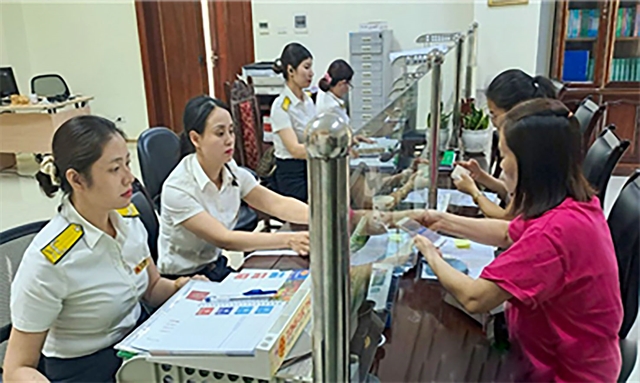Under the proposal, the government plans to clarify tax rules for foreign companies that do not have a fixed place of business in Vietnam.
Hanoi – The government recently proposed amending a provision of the Tax Management Law to better manage the tax affairs of foreign suppliers.

Under the proposal, the government plans to further clarify tax rules in response to foreign businesses that claim they have no fixed business establishment in Vietnam and apply for large tax refunds.
In Article 42, Paragraph 4 of the current law, foreign suppliers engaged in e-commerce, digital business and other services who “do not have a permanent establishment in Vietnam” have the obligation to register, declare and pay taxes in Vietnam directly or by authorization.
The Ministry of Finance proposed to delete the phrase “no permanent establishment in Vietnam” in Article 42, paragraph 4. This amendment will bring many changes to the way Vietnam taxes foreign suppliers.
Many foreign suppliers, such as Meta, Google and Netflix, have applied to Vietnam’s tax authorities for refunds of corporate income tax they have paid because they do not have a permanent establishment in Vietnam. The amount of tax refunds requested is as high as hundreds of billions of VND.
Many experts agree with the government’s proposal, believing that it is necessary to delete the expression “no permanent establishment in Vietnam” in order to ensure fairness among taxpayers and for foreign suppliers to fulfill their tax obligations to the Vietnamese state.
According to Nguyen Duy Nguyen, general manager of Huang Jiao Law Firm and lawyer, Article 42, paragraph 4, stipulates the tax declaration and calculation principles for e-commerce, digital business and other services when foreign suppliers do not have a permanent establishment in Vietnam.
Therefore, for foreign suppliers who set up a permanent establishment in Vietnam, they do not need to directly or authorize tax registration, declaration and payment in Vietnam. In this case, foreign suppliers only need to pay corporate income tax on the profit allocated to the permanent establishment in accordance with the relevant provisions of the Corporate Income Tax Law and the Double Taxation Avoidance Agreement.
At the same time, according to the VAT Law and the Corporate Income Tax Law, foreign suppliers should pay corporate income tax and VAT when conducting e-commerce, digital business and other services in Vietnam. This also makes it difficult for tax authorities to collect taxes from foreign e-commerce service providers, such as the case of online booking service providers Booking and Agoda.
“In my opinion, in order to achieve fairness among taxpayers and ensure sufficient tax revenue from e-commerce activities, it is necessary to delete the statement in Article 42, paragraph 4, regarding ‘no permanent establishment in Vietnam’,” Nguyen said.
The General Department of Taxation (GDT) also believes that retaining the expression “no permanent establishment” may no longer be suitable for current e-commerce businesses. Online transactions do not require a physical presence in Vietnam, such as offices, factories or employees, which makes the concept of determining a permanent establishment more complicated.
According to the General Department of Taxation, the Double Taxation Avoidance Agreement (DTA) has been signed for many years and mainly applies to traditional business activities with physical presence. However, e-commerce mainly operates in cyberspace and does not rely on physical presence, which leads to the inadequate applicability of current tax regulations.
Economist Dr. Ding Zhongsheng also pointed out that the application of double taxation agreements has brought difficulties in determining tax liabilities. Many foreign suppliers use these agreements to circumvent tax obligations. This situation has caused concerns, especially when corporate income tax on e-commerce transactions may become an important source of revenue for the national budget in the future.
Therefore, Ding Sheng believes that revising the provisions of Article 42, paragraph 4, will provide tax authorities with more effective tax management opportunities. If the phrase “no permanent establishment in Vietnam” is removed, tax authorities will have a legal basis to require foreign suppliers doing business in Vietnam to fulfill their tax obligations, regardless of whether they have a permanent establishment in Vietnam.
Removing the phrase “no permanent establishment in Vietnam” from the law is an important step in Vietnam’s tax reform. This not only ensures the country’s tax rights, but also creates a clear legal framework for foreign suppliers doing e-commerce business in Vietnam.







